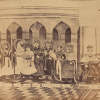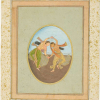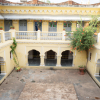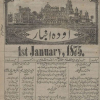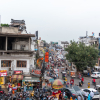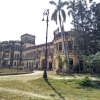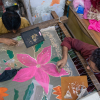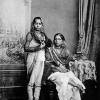Dimpy Mishra also runs the Ranglok Academy for Professional Arts in the city. After finishing his early education from Agra, Mishra completed his postgraduation in theatre arts from Bhartendu Natya Academy in Lucknow. He has also appeared in a feature film, Bhoomi, directed by Omung Kumar. In 2018, he was given the Uttar Pradesh Sangeet Natak Akademi Award for his contribution to theatre direction. In this interview, he discusses his experience of rejuvenating and nourishing the tradition of theatre in a professional capacity in Agra. He also talks about the social and cultural roles and responsibilities of theatre as an art form, the status of theatre in the Hindi belt, the relationship between theatre and folk culture and traditions, and the challenges for Hindi theatre amid changing cultural and socioeconomic situations.
Following is and edited transcript of the interview conducted on September 15, 2019, in Agra. The original conversation took place in Hindi and has been translated into English.
Sumit Chaturvedi: Could you describe how your journey of theatre began?
Dimpy Mishra: I must have been four years old [in 1987] when my father got me admitted to the Little IPTA [Indian People’s Theatre Association] camp, which used to be organised during the summer vacation. It was there that I met late Rajendra Raghuvanshi [former national general secretary of IPTA]. I was with Little IPTA for the next seven or eight years. In the two-month-long camps, a lot of things were taught to us, such as acting, singing, playing music, etc. We were also sent to participate in activities involving singing and acting that were held in the city. By the time I was in the sixth standard, I had developed a sense of delivering dialogues as well as voice modulation. It was then that I was inducted into the senior team of IPTA where I became its youngest member at the time.
SC: What kind of difference do you perceive between theatre that is professionally practised and activism-based theatre?
DM: It is important to understand that, in principle, there is no difference between activism-based theatre and professional theatre. If you are professionally performing a play that is centred around a message and is meaningful in that sense, which you would do in activism-based theatre, it too is activism. What we are doing professionally is the very thing that an activist should do. We have performed Jis Lahore Nahi Vekhya O Janmiya Hi Nahi [One Who Has Not Seen Lahore, Has Never Been Born], Kanyadan [The Gift of the Daughter], Jati Hi Pucho Saadhu Ki [Only Ask the Caste of the Sage], Court Martial, etc. If you perform the same play using modern sound technology, effort and honed skills, it becomes a professional performance. We are performing the same politically oriented plays that were taught to us. This is the political thought that we were brought up with and imbibed. We are performing the very plays that were taught to us on a political basis, based on the belief that was built in our minds, the one which we accepted naturally. That political belief is people-oriented, and it is intended for their well-being. If a meaningful thing reaches a wider audience in a commercial manner, does it lose its meaning for the public? I think not. Rather, its impact and influence increases.
SC: Speaking about the theatre scene in the entire Hindi belt, what differences have you observed develop over time? And how do you perceive its present state vis-a-vis theatre in other regions?
DM: Hindi theatre has never been able to compete with Bangla, Gujarati or Marathi theatre. They have always been ahead of us and continue to do so. We should have no qualms in accepting this. We should rather ask: Why cannot we make theatre a part of the lives of people in the Hindi belt? More theatre work is being done today than before. Yes, the treatment and techniques have definitely changed. However, it is necessary for any theatre artiste or activist or any professional to keep themselves up to date with the latest advancements. If one does not change with time and does not change their techniques, they will wither away. We will have to keep up with the new generation, and understand what theatre means for them. You can teach them the works of Mohan Rakesh, Vijay Tendulkar and Jaishankar Prasad as a reference to the theatre of a bygone era, but if they want to make some amendments in their scripts according to the modern times and scenario, you will have to allow them that liberty.
SC: Do you think theatre in the Hindi belt benefits from the success of theatre in other places?
DM: Hindi theatre can definitely take some lessons from theatres of other regions. Gujarati, Bangla and Marathi theatre have completely transformed themselves. Their focus has shifted from solely politically driven themes towards entertainment. It is not that there are no more politically oriented performances but that ratio has changed. Today, when they do four shows a month, one of them is a politically oriented performance and the other three are light comedies so that audiences can come and relax, watch something with their families and go back happy. Hindi theatre has not yet reached that level. However, Hindi theatre work in Mumbai is operating on this pattern. In North India, people are still towing the same old theme because of their rigidity. We were also following the same pattern for the last seven–eight years but, learning from experience, I realised that we need to put a little entertainment in our performances. We think that out of seven or eight performances we produce in a year, we need to keep three or four such plays which are full of humour and entertainment. Even the audiences have given us the same feedback, that there needs to be some light-hearted performances also.
SC: According to you what is the relationship between theatre and reading culture of a city or a region? Is there a direct relation between theatre and the culture of reading literature?
DM: There is a very intrinsic relationship. Wherever there is a robust reading culture and book publishing scene, the scene of art and culture is completely different. I will narrate to you a recent incident told to me by a former student of mine, Saransh Bhatt, who had gone to conduct a workshop in the Hubli district of West Bengal. He was in a far-off village that did not even have proper roads. He was sitting with his team at a small tea stall and as they were sipping tea, the tea seller asked them, ‘Which play are you performing this time around?’ These people were stunned to hear him ask about the play. Before they could say anything else, the tea seller added, ‘Last month, The Tempest was staged.’ So, one can understand that it does not matter whether it is a village or a city... Literature has emerged from the public only, but today the very nature of the public is changing. Even folk literature, songs and other materials written in folk languages have changed. If you listen to Haraynvi or Bhojpuri songs, and the same is being reflected in our Braj culture, only vulgar songs are being presented in the name of folk culture.
SC: What was your idea behind founding the Ranglok Sanskritik Sansthan, and how would you describe this group’s journey?
DM: When I completed my postgraduation from Bhartendu Natya Academy in 2006, I worked as a freelancer for about two years in Lucknow. After that, I got a permanent job there. In 2010, my wife and I shifted back to Agra. In cities like Lucknow and Allahabad, there are at least 15 or even 20 performances in a month related to dance, theatre or music. But in Agra, that cultural scenario was severely lacking. Our friends and comrades thought that it would be hard to thrive without theatre. This is when we started a small group by the name of Awaz Kala Manch, and staged some performances. After that, we started a registered group by the name of Ranglok. After the group was started, students gradually began to enroll and soon they grew quite fond of me. After returning from my job at five in the evening from college, we used to conduct rehearsals till 10 in the night. We did not have any space. We used to rehearse in coal sheds or at someone’s home or even beg for a room in a banquet hall to rehearse. I used to wait for my salary to be credited so that performance halls could be booked for the show. Earlier, no one used to buy tickets for our show or make donations despite our requests. Today, however, we have annual memberships of about 250 people, and about 500 to 600 people regularly attend our shows. We also have our own rehearsal space now, where we have partnered with those teaching dance and music.
SC: For the last few years, you have been organising theatre festivals, in collages, etc., from time to time. Have these events had an impact on theatre in the city? If so, how?
DM: Organising festivals and inviting groups from outside definitely makes an impact on our work and our connection with the people. We had planned our first festival in 2017. We would always be thankful to great artistes like Raghubir Yadav, Alok Chatterjee, Jayant Deshmukh and Salim Arif who participated in the festival with their shows. The tragedy with Agra was that national and international shows of such kind were not staged in the city. When actors of that level come to the city, students get inspired, as they get to watch something new. For audiences, it is indeed no less than magic. Since it is an annual event, people wait in anticipation for an entire year, and it is four days of a completely different atmosphere in the city. So, it is making a difference, and we are now also organising the third edition of the Ranglok Theatre Festival.
SC: Earlier, we were talking about the impact of theatre on cultural development. Is it fair to expect theatre to impact the culture of space in an effective way?
DM: In any other form of art, you cannot establish a direct conversation with the audience, be it singing, dancing, playing music or painting. In theatre, the actor can directly convey to the audiences through a dialogue, what a singer would have to convey through music and a dancer would have to convey through movements. That is why theatre has been deemed the most impactful performing art because what is said through it reaches out to people immediately and with a lot of ease. Although, in terms of performance, it is very difficult to practise because it is a composite art where you can stage an act only by taking everyone along. After watching a politically inclined performance, what is said on stage immediately sets into the minds of spectators and they remain influenced by it for many days to come. So, it is an undeniable truth that theatre has the potential to impact any society culturally and socially.
SC: What role do you envision for theatre with regards to conserving the folk musical heritage and promoting it further in general, specifically in Agra?
DM: The problem we are currently facing with musical theatre is that live music is almost completely disappearing from theatre. Actors are no longer musically inclined. Musical theatre was a medium through which our folk songs and tunes could be brought alive among the audiences. People may not like merely listening to folk music but would appreciate it when that music is presented along with performance, enhancing its relevance and importance. It could help them recognise songs in association with the events in which they are sung. Such portrayals make people realise that this indeed is their heritage. There are very few people who are working to take musical theatre forward. Unless the number of such people increases, it would be difficult for us to determine the role of theatre in conserving folk culture and its heritage.
SC: How do you see Hindi theatre and theatre in the Hindi belt progressing in the near future?
DM: I have always been an optimistic person. I started earning a living by teaching jan geet [people’s songs] to children. We have been able to reach out to so many people through that work. So, obviously, it seems that the future of theatre is promising in Agra. I have, for many years now, been observing kids passing out of institutions like Bhartendu Natya Academy, National School of Drama, Madhya Pradesh Natya Vidyalaya, and others and returning to their respective cities to do theatre. They even take up jobs in schools and work in theatre in the evenings. Thus, a foundation of professional theatre is being laid out in the small cities and towns in the Hindi belt. Theatre is the pulse of time, as are all performing arts. If this pulse continues to beat, humanity will stay alive.



